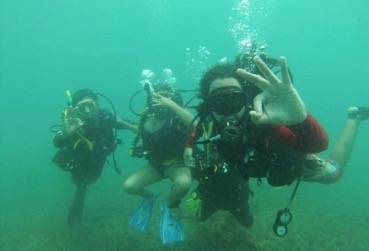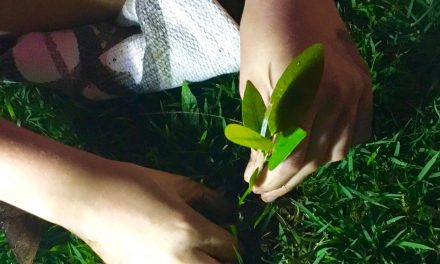Giving the example, strengthening the sense of community and sea, the youth are an engine of change
Article by Sol Valls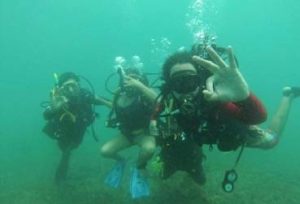 The Community Center for Diving and Ambassadors of the Sea is a non-profit social organization of Puerto Viejo, Costa Rica, founded in 2014 by local divers. Their goal is to create opportunities for the youth in diving with purpose and, in this way, generate a change that transcends generations, leaving a mark on both the community and the environment.
The Community Center for Diving and Ambassadors of the Sea is a non-profit social organization of Puerto Viejo, Costa Rica, founded in 2014 by local divers. Their goal is to create opportunities for the youth in diving with purpose and, in this way, generate a change that transcends generations, leaving a mark on both the community and the environment.
People call it a “Center” because it covers many areas and numerous activities. The goal is to produce the greatest possible impact, starting in the South Caribbean, but not limited to that geographic zone, promoting youth initiatives wherever possible. It doesn’t matter how; often it’s not known where the money will come from. But “if it has to be done, it is done, one way or another; usually, this is where the magic starts,” states the president of the organization, Gloriana Brenes, with conviction.
Together, its members educate and train young people of different ages in diving, community underwater archeology, beach and seabed cleaning, palm tree planting, geo-referentiation, photogrammetry, lionfish capture, and coral monitoring and restoration. The mission is to combat habitat destruction, with the protection and conservation of the sea and its ecosystems, and species, always from a community approach.
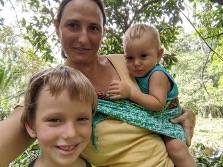
Gloriana y her kids, Momo y Ayu
It’s been nine years since Gloriana moved to Puerto Viejo. Apart from assuming the greatest responsibility of the Centro, she is the mother of Sangye (17), who already has a project supported by the Inter-American Development Bank. Her other children include Momo (6), her top warrior in the palm tree plantation, and clearing and conservation of beaches, and Ayu (1), the youngest diver who keeps Gloriana company on her adventures, watching her out on the boat while she dives in. Her family is also members of the Ambassadors of the Sea, because “if I’m in, they all are.”

Sangye
***
They don’t know that they know
-They tell you what they’ve done without considering it a big deal. Not until they reach a certain age, and looking back, do they realize they are experts in many areas. She said that they teach them to talk in public, and they become scared to death, stutter, and even faint, but they grow and empower themselves. Only from a distance, seeing their achievements from an external point of view, hearing the echo of their audiences, do they become aware of their own value. To witness this process is the most gratifying aspect of it all. THIS is why she keeps trying to make time for herself, to take, bring, fill tanks, teach kids the habit of picking up trash, plant palm trees, organize camps for kids, prepare webinars, and so on.
***
WHAT I WANT as the starting point
– When you’re a kid you know where your heart is, but when you grow up you forget because you abandon almost everything for the sake of rationality. Ask yourself what your priorities are. Because maybe what you care about is not what you’re fighting for. Ask yourself so that you don’t forget about it when you go around supporting big causes.

Felix Morrison
***
The social component
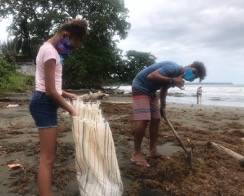
Esteban and his sister picking up sargassum (algae) from the beach
***
The sea is our backyard
“We are aware of the existence of academic institutions and ONGs that are dedicated to nature conservation and, specifically, sea and marine ecosystems’ conservation. Why does the Center provide a different insight into the subject?”

Kids helping with the collection of trash from the beaches
eaches
Although for the talented Englishman–who, by the way, spends a large part of his days removing fishing line from corals–a marriage between empirical and academic knowledge is necessary, the social component is the essence and should never be left out. “With a local organization that ensures that children and grandchildren adopt the practices, you save time, tears, and effort. An outside NGO does not know if it will be there in ten years. Many times their work depends on donations, and when they expire, they go and leave everything behind,” explained Felix.
The Center’s projects are interested not only in helping to preserve the environment but also in creating opportunities for local people to maintain the benefits of the system. They intend to produce results that are functional in the long term
***
Trading time for experience
The dynamics of the Center are characterized by a fair and spontaneous distribution of tasks. Understanding who is available for each occasion, its members make agreements and operate. It is not a hierarchical organization, but horizontal. “It is a commitment of time in exchange for experience and knowledge. For hours and dedication, you can even win a scholarship to go to Florida, and that was the best adventure I had last year,” noted Felix. He shows a glorious smile every time he talks about his trip to the U.S. Caribbean for special training in coral restoration with their new sister organization, Diving With a Purpose (DWP).
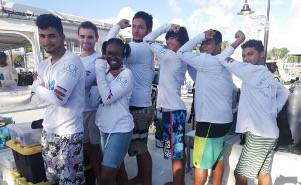
The youth group from the Center when they went to Florida for training with DWP
***
The old and the young
Although the driving force behind the creation of the Center was to give the command of change to youth – giving them the opportunity to make the Center’s projects their own and to promote the appropriation of their natural and cultural heritage – its members agree that there needs to be a balance between mobilizing youth and the experienced, wise adults who maintain order, which is key to its proper functioning.
“We are lucky to have founders who were not fooled, shut up, or bought. We are talking about the generation that fought against oil exploitation and many other threats. They are the ones who lead and guide us, our spiritual guides,” explains Felix.
***
Coral planting and restoration project
A coral is an invertebrate that only lives and rebuilds in healthy environments. Coral reefs, also called “sea forests,” form one of the most diverse ecosystems on earth. They are fragile because they are sensitive to temperature changes, yet essential for everything to function.
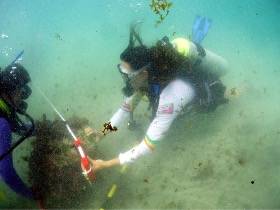 |
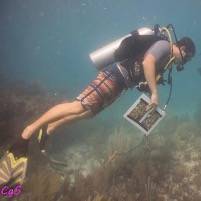 |
 |
Although coral reefs occupy less than 0.1% of the total surface of the oceans, they are the habitat of 25% of marine species. In addition to providing services to tourism, fishing, and the protection of the coastline, they show us how life is in the ocean.
Today, these corals are threatened by climate change, ocean acidification, explosive and cyanide fishing, resource depletion, and harmful land use, such as agricultural and urban drainage, as well as water pollution.
The United Nations Office for Project Services (UNOPS) and the Costa Rican Institute of Aqueducts and Sewers (AyA) will play no less a role in this project, funding a training program for the youth of the Center in diving skills and programs for the protection of the marine ecosystem — among them, monitoring and decontamination of corals.
Other project strategies to combat climate change include creating hybrid corals, which are more resistant, and identifying super corals, or corals of the future, whose performance is particularly good under stressful conditions, such as extreme temperatures and water pollution.
“If we believe that without the ocean we will live another day, we are very wrong. Humans depend a lot on it. It is the ocean that does not need us,” asserts Gloriana.
***
Conscious fishing and the lionfish invasion
“Fishing, hunting, if it’s for survival, then it can be respected. If it’s meant to be exploited, it cannot. If I eat meat, it is that of the invasive fish,” declares Felix.
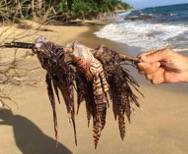
Community efforts to curb the lion fish invasion
Another objective of the Center is to revive the guardians of the sea: local fishermen, many of whom aim to control fishing and protect necessary species for the balance of the ecosystem from being killed. Parrotfish, for example, clean parasites that grow on corals and eat the algae that compete with them and smother reefs. In addition, each of these fish discharges up to 100 kg of white sand per year, counteracting the erosion of beaches.
Felix and Esteban say that it is common to find sharks with hooks in their mouths, dead, lying on the shore, discarded, and conclude that “when a resource is overexploited, something must be done about it.”
Although lionfish are not a problem in their natural habitat – the Australian coasts and the Red Sea – they have posed a serious threat to the coral reefs of the Caribbean Sea for more than 10 years. It is a voracious predator without a predator and reproduces fast. It can destabilize marine ecosystems and alter local economies.
“It eats many species, yet nobody eats it. With its toxin, it frightens large prey. But it is not poisonous, and it can be eaten,” explains Esteban, who regularly participates in fishing tournaments organized by the South Caribbean Artisan Fishermen Association, and in activities to raise awareness amongst the community on the invasive fish problem.
***
An empowered community
Culture, jungle, beaches, sea, biodiversity, and a fishing village that lives in permanent communication with the reef. We are talking about an exemplary place that has conserved its environment and maintained its essence over the last 30 years. In contrast, in several Caribbean countries, almost everything has been privatized, urbanized, and commercialized, and the exuberant, pristine nature has largely disappeared. In Costa Rica, we are talking about an indigenous population that was not colonized, and lived, grew food, and was sustained by its environment without destroying it. We are talking about Puerto Viejo, a cosmopolitan, strong, and empowered community.
“I think it’s ancestral, people have it in their veins.”
Felix’s dream is to see biodiversity flourish once again. “My ambition,” he says with perky humor because dreams are often unattainable, “is to make this as real as possible. No matter where I am, I want to make an impact, live, and fight for what I care about. Without this, I would not be able to find either happiness or satisfaction,” concludes the young man whose life force is the direct contact with nature.
“I would like to tell the young people of Talamanca to think of themselves, to value themselves, and to follow their dreams, whatever these are. To not let themselves be crushed by anyone, to look for solutions, even when they cannot find them. To be strong,” Esteban exclaims.
“I would love for us, as a community, to wake up and see that Talamanca has all the conditions to be a global example of that Costa Rica where everything is possible. To see that instead of overloading, destroying, abusing, and overexploiting our surroundings, we could live in balance. We could transform tourism to have less impact with greater respect. We could create a win-win economy. I would love for us to see the significance of these people, this mixture of foreigners, indigenous, black, Chinese, this community that wants to live, united, in a magical place”, ponders the president of the Center, and admits that her dream is to see a youth full of hope and possibilities, who do not feel that they have to go to San José and get a bachelor to be something. A curious youth that discovers that by studying its roots, it can find its place in the world and understand how to take a step into the future, “because the course of our history depends on that,” concludes Esteban.
Social media for the Community Center for Diving and Ambassadors of the Sea
Facebook
Blog

